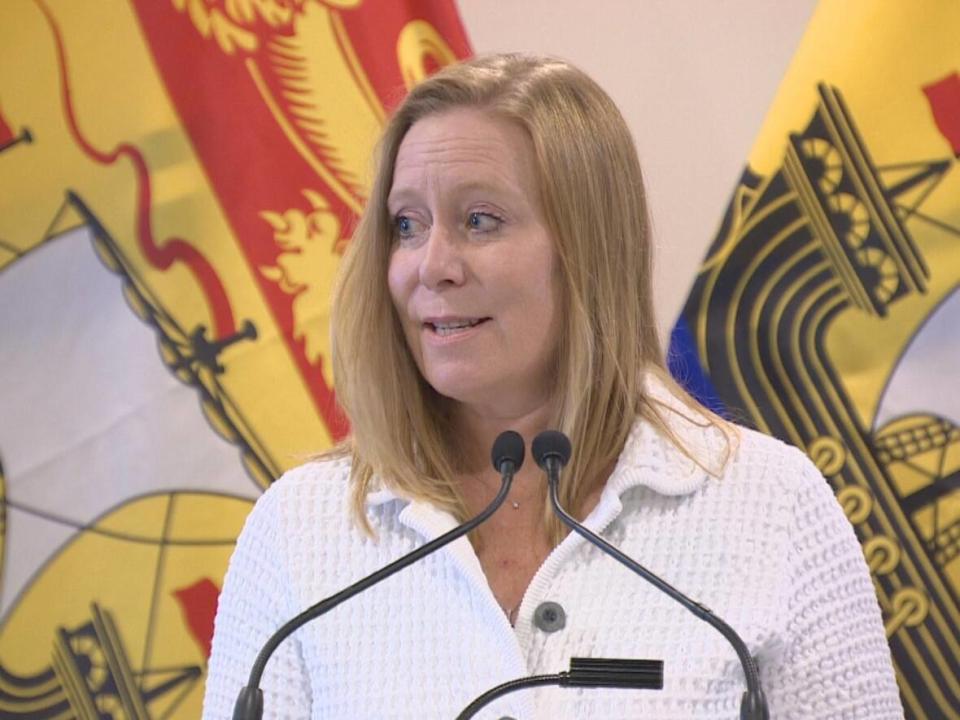Economist corrects minister who cited him in defence of dropping rent cap

A New Brunswick economist is setting the record straight after Housing Minister Jill Green cited him as an expert who doesn't think rent caps work.
Richard Saillant said he doesn't oppose rent caps and doesn't believe they discourage housing development, which is what Green suggested in an interview with Information Morning Fredericton.
Green has said that part of the reason the province is not extending the 3.8 per cent rent caps beyond this year is that "most economists" say they don't work and they can harm development.
"Many studies out there, by economists, saying that rent caps don't have the desired effect, and so I've read a number of those," Green told Information Morning Fredericton this week.
When asked to name some of those economists, Green said: "Richard Saillant is an example of an economist that has written about the rent cap, but … this is a standard thing that is written all over North America about rent caps."
Saillant said he was surprised to hear this. He said he believes rent caps can work, if they're not the only affordable-housing measure.
"Rent caps, if they're part of a broader suite of other measures that the government would take, are probably very reasonable compromise," he said.
"I think it should be a temporary but reasonable compromise for helping New Brunswickers meet the housing crisis that we are faced with today."
Saillant said he had to think hard about what Green might have read to get the impression he opposes rent caps.

The closest thing he could find was a newspaper column from two years ago, where he said rent caps were a "blunt instrument," but would probably be used by the government eventually, he said.
He called them a "blunt instrument" because they alone can't fix the affordable housing crisis, he said.
"Rent caps do not help out with students who are looking for an apartment every year," he said. "They're not protecting those who are looking for a job in a different community. They're not protecting newcomers. These people need help too."
Recently, the province announced $100 million for building 380 affordable housing units and renovating 110, and said it will partly finance an organization focused on finding more rural housing called Housing Hub of New Brunswick Inc.
Economist, researcher, data dispute rent cap's harm on development
Green told CBC on Monday that has hard evidence the rent cap has caused housing development to stagnate: In 2021, construction started on projects that would add 2,600 and new units in the province. In 2022, that number is down to about 1,000 new units.
"I think less than half the units being built this year than last year is evidence," she said.
But Saillant and housing scholar Julia Woodhall-Melnik dispute the conclusion Green is drawing and the blame she's assigning to the rent camp.
Saillant said it's true that construction activity is down outside of the three largest cities, but the rent cap is not the reason.
It's more likely that an extreme reduction in labour and the increased material costs are having the most impact.
"I don't buy that argument for a single minute, the reason being that the overarching constraint on housing supply these days is labour," he said.
"The industry is already operating at full speed, full steam, and they're saying that their critical bottleneck is labour."
John-Ryan Morrison, the Construction Association of New Brunswick's executive director, previously said the cost of materials has gone up more than 80 per cent in the last two years, and New Brunswick would be short about 10,000 construction workers in the next three to four years.
Woodhall-Melnik, who is a housing researcher at the University of New Brunswick, said apartment owners are doing well,despite the cap.
"There is stuff written by economists, planners, urban geographers, folks that do regional studies, housing studies that dictates that, you know, rent caps can work with either minimal or no impact on supply chains," she said.
Statistic Canada numbers show New Brunswick landlords have generated rent increases well above national averages this year, despite the rent cap.
Rents in the province rose 7.9 per cent over the last 12 months ending in October — partly because of new tenants moving into vacant units, fuller buildings, and a series of tax cuts and other concessions by provincial and municipal governments, Woodhall-Melnik said.
New Brunswick's largest landlord Killam Apartment Real Estate Investment Trust reported that earnings in greater Moncton, Fredericton and Saint John all grew at rates above national averages during the first three quarters of 2022.
Saillant said what's needed are skilled immigrant construction workers and large infusions of cash to make affordable housing projects more attractive to developers.

